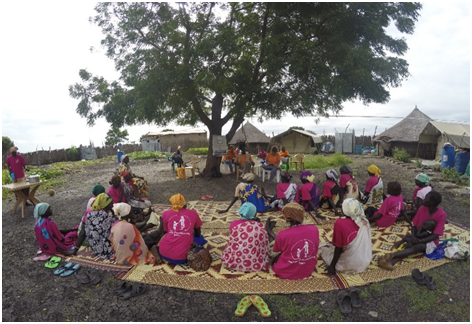Women Protection Teams working to end gender-based violence
 Despite commitments by the warring parties in South Sudan to implement the peace agreement signed in August 2015, violent conflict continues. After over two years of war, the country’s infrastructure has been left devastated and the people of South Sudan continue to face a humanitarian crisis. The impact of the war on South Sudanese women and girls has been particularly horrific. Amidst the extraordinary rates of forced displacement, pervasive violence and breakdown of rule of law in many location, an estimated 32,000 South Sudanese women and girls are exposed to the risk of sexual violence.
Despite commitments by the warring parties in South Sudan to implement the peace agreement signed in August 2015, violent conflict continues. After over two years of war, the country’s infrastructure has been left devastated and the people of South Sudan continue to face a humanitarian crisis. The impact of the war on South Sudanese women and girls has been particularly horrific. Amidst the extraordinary rates of forced displacement, pervasive violence and breakdown of rule of law in many location, an estimated 32,000 South Sudanese women and girls are exposed to the risk of sexual violence.
There is a clear correlation between food insecurity, fuel and resource needs and gender-based violence (GBV) in South Sudan (See: South Sudan GBV Cluster, (2014) ‘Between a Rock and a hard place: Why we need to invest in GBV in food crisis? The Link between Food Security and Conflict Related Sexual Violence in South Sudan’). There are consistent and widespread reports of women and girls being raped, abducted and murdered as they leave the relative safety of camps, in order to access water, food, firewood or shelter materials (Alison Giffin et al. “Will they Protect US for the Next 10 Years: Challenges Faced by the UN Peacekeeping Mission in South Sudan,” Stimson Center, November 2014 p. 22).
Sexual violence has become a tool of war in South Sudan and the lack of awareness and underlying stigma surrounding GBV makes it difficult for survivors to seek help. When they do speak out, justice is elusive and survivors are often punished or ostracized.
Due to the extreme risks of violence women and girls face, NP provides direct protection, including accompaniment for women and girls collecting firewood and patrolling high risk areas to monitor for signs of conflict and provide a protective presence. NP also works to develop referral pathways for survivors of sexual assault to ensure they have immediate access to critical, and often life-saving, medical and psychosocial services.
To address gender-based violence NP has established twelve Women’s Protection Teams (WPTs) across the country since 2011. The WPTs have successfully advocated for accountability from both the military and the police, supported armed cattle keepers to solve conflict without violence and have engaged in dialogue with local leaders about the importance of the participation of women in peace and security fora.
The WPTs generally consist of 15-30 women trained and coached to implement violence-prevention activities in their communities and promote the empowerment of women in South Sudan. WPTs are unpaid, community-led groups that promote local solutions to conflict with an emphasis on peace-building and violence prevention. WPT activities focus on two aims:
• Preventing and responding to violence; and
• Supporting systemic change at the local, regional and national levels.
The experience of Sarah, a leader of the Ulang Women Protection Team, led her to understand that support and “approval” from their community is critical to accomplishing their goals. Recently, she was questioned by some men in her community who didn’t understand why she “moves around with all the women in pink shirts.” Though the men were intoxicated and challenging her, Sarah responded in a respectful and peaceful manner explaining that the women have come together to make their surrounding area more peaceful. She gave examples of how the community’s situation had improved because of the work of the WPT and how it has had a positive impact on women individually.
A multi-year grant from the Dutch government is making it possible for NP to increase the scope of its work with the WPTs to promote women’s participation in peace building and protection to reduce the prevalence and impact of conflict and GBV on communities in South Sudan. We will aim to establish 24 WPTs in the project sites that will receive extensive training, capacity building and mentoring. In each site, to maximize impact in communities, 300 additional women, men, girls, and boys will be trained in GBV awareness and unarmed civilian protection. They will be spreading their knowledge and challenging the behaviors and attitudes in their communities that form the basis of violence against women and girls.
